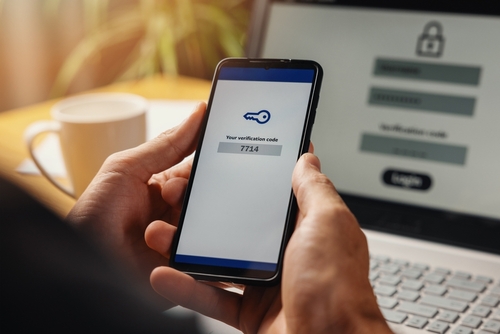White Friday in the UAE brings incredible deals, but it also attracts scammers. In recent years, reports of White Friday fraud have increased significantly. Nearly half of UAE consumers have experienced a UAE shopping scam, and in 2024, there were 38 million phishing attacks reported.
You don’t need to go into the holiday season feeling vulnerable. In this Remitly guide, we’ll walk through the most common White Friday scams in the UAE, show you how to spot warning signs, provide practical protection tips, and explain what to do if you suspect fraud.
Prefer to read in Arabic? See our guidance on UAE holiday shopping scams in Arabic here.
Common holiday shopping scams targeting UAE residents
Even if you shop online often, new threats pop up every holiday season. Here are the most common types of fraud to look out for.
Fake online stores and social media ads
One of the most common scams involves fake online shops or misleading ads on TikTok, Instagram, Facebook, and Google. Scammers often make these sites look almost identical to well-known UAE retailers, copying logos, colours, and layouts. The differences can be tiny, like a hyphen in the web address (shop-dubai.ae instead of shopdubai.ae) or a ‘0’ instead of an ‘O’.
These can seem completely legitimate. They might even feature eye-catching prices and fake positive reviews to build trust. However, once you order, you might get a low-quality product, or you may never receive your item at all.
Luxury goods are commonly featured in White Friday scams, with high-end bags, watches, and electronics often advertised at very low prices. Unfortunately, these items are rarely genuine, and scammers sometimes vanish entirely after taking your payment.
Before buying, double-check the web address, look for the padlock symbol or ‘https’, and compare the site to the brand’s official website.
Delivery service phishing scams
Delivery-related scams are common during White Friday. Fraudsters often impersonate familiar courier companies such as Aramex, Emirates Post, or Fetchr. You may receive a text or email saying your parcel can’t be delivered unless you pay a small fee.
These messages can look convincing, often copying the courier’s logo and brand colours. However, the link usually leads to a fake payment page designed to steal your card details, Emirates ID number, or login credentials.
For example, a message might say something like ‘Your parcel could not be delivered. Please pay AED 3 at this link to reschedule delivery.’ Because the fee is small, many people click right away.
Some scammers even time these messages to match real delivery windows, which makes them appear even more believable. In one case, a resident nearly lost AED 40,000 after trying to pay a fake AED 3 fee.
Always cross-check unexpected delivery alerts by contacting the courier’s official customer service line or tracking your parcel using the official app. This simple step prevents many fraud attempts and increases holiday shopping safety in the UAE.

Too-good-to-be-true discount offers
White Friday is exciting, and it’s easy to get caught up in the thrill of finding a bargain. Scammers capitalise on this by advertising products at massive discounts, sometimes with countdown timers urging immediate purchase. You might see a designer handbag, laptop, or phone at 80-90 per cent off.
These offers are designed to pressure you and limit your time to think. After you pay, the item might never arrive—or it could be completely different from what you expected.
Some scammers also inflate the original price of an item to make the discount seem larger. For example, they may claim a product was AED 12,000 and is now AED 1,000.
Before purchasing, compare prices across reputable UAE retailers or use browser extensions and apps that track historical pricing (Maafloos is one example). This helps you spot unrealistically low deals. If a deal looks too good to be true, it probably is.
Social media contest and giveaway scams
Fake social media contests are popping up more often, especially during shopping seasons. You might see a post or receive a direct message claiming you’ve won an expensive prize, and all you need to do is share the post, tag friends, or send a direct message to claim it.
If you engage, scammers may ask for personal info, such as your phone number, home address, bank details, or even a small payment for shipping or processing fees. These tricks are designed to collect data that can later be used for identity theft or further fraud attempts.
You can usually spot these scams by taking a closer look at the account behind the post or message. Is the account new? Does it have very few followers? Are contest rules missing or poorly written? Are you being asked to pay fees or provide sensitive information?
When in doubt, don’t click. Instead, report suspicious accounts and warn your friends. Sharing your knowledge helps keep everyone safer.
How to spot these scams: red flags every UAE shopper should know
You already have a good sense of what feels normal when shopping, so trust your instincts. Keep your eyes open for the following warning signs of potential scams.
- Poor website design or errors: Mistakes in grammar, spelling, or layout, whether in Arabic or English, can signal a scam. Legitimate retailers usually invest in polished, professional content.
- Urgency or countdowns: Phrases like ‘Buy now or it’s gone forever’ or ‘Only 1 unit left’ are classic pressure tactics. Take a moment before clicking.
- Fake reviews: Glowing, generic reviews that are posted all at once are often fake.
- Unusual payment requests: Legitimate retailers won’t request direct bank transfers, cryptocurrency, or ask you to share your card info over WhatsApp.
- No clear UAE business registration: If there’s no UAE trade license, company address, or support phone number, that’s a red flag.
- Vague policies: Check return policies and seller identity. If answers are unclear or evasive, don’t proceed.
- Communication only via messaging apps: Legit retailers usually offer email or phone contact. If a seller insists on WhatsApp or Telegram only, be cautious.
Stay protected with UAE shopping tips
Here’s your essential toolkit for holiday shopping safety in the UAE.
Shop smart with trusted platforms
Start with platforms you already know and trust, like Amazon.ae, Noon, Carrefour UAE, and Lulu. These platforms have safeguards in place to protect buyers and sellers.
If you’re using a marketplace with multiple sellers, take a moment to check who you’re actually buying from. When possible, choose items that are fulfilled by the main platform rather than a third-party vendor. You can find out a lot by quickly checking seller ratings and past reviews.
And if you spot a deal on social media, resist the temptation to click the ad directly. Instead, type the website address manually and avoid clicking links in ads that may lead to fraudulent websites.
Secure your transactions
Whenever you reach the checkout page, look for the padlock icon in your browser and ensure the address begins with https://. That simple ‘s’ means that your connection is encrypted.
Use payment methods with buyer protection, like Apple Pay, PayPal, or credit cards. These services let you dispute unauthorised charges if something goes wrong.
Never share your card number, PIN, OTP, or CVV over WhatsApp or social media. Legitimate sellers and couriers won’t ask for this.

Verify before you buy
Before you order, check independent review platforms like Google Reviews, Trustpilot, or UAE consumer forums. They often give a more balanced view than seller testimonials.
You can also confirm whether a business is registered by searching UAE trade license directories or local commerce databases.
Read delivery and return policies carefully. If a store doesn’t accept returns or expects you to pay all costs, consider it a red flag.
Protect your personal information
Never share your Emirates ID number, bank details, or passwords in chat messages.
Avoid clicking on links from unexpected emails or text messages. Instead, navigate to the company’s official site or app manually, or call their verified customer service line.
Use strong, unique passwords for each site to enhance safety. Tools like password managers make this much easier. If you haven’t already, enable multi-factor authentication (MFA) on your accounts. Even if someone guesses your password, MFA can stop them from accessing your account.
What to do if you’ve been scammed: your action plan
If something goes wrong, try not to blame yourself. These scams can trick even careful shoppers. Here’s how to take control.
Step 1: Report the scam immediately
Start by notifying the authorities:
- In Dubai, file a report through the Dubai Police eCrime portal or mobile app.
- In Abu Dhabi, report suspicious activity to Abu Dhabi cybercrime authorities via the Aman Service.
- In Sharjah, use the Ministry of Interior (MOI) online portal or app.
You can also forward fake links or phishing messages to the Telecommunications and Digital Government Regulatory Authority (TDRA) so they can block the website. In some cases, UAE consumer protection agencies can also help.
Step 2: Protect your finances
Next, secure your accounts. Contact your bank immediately to report the scam. Most UAE banks have dedicated fraud departments that can freeze suspicious transactions or block future charges. Most UAE banks allow you to temporarily turn your credit or debit card off via their mobile app, which lets you prevent further unauthorised transactions.
If you paid by credit card, ask about chargeback options. You may be able to reverse the payment. Continue monitoring your statements for several weeks, since some scammers attempt additional withdrawals later.
Step 3: Gather and save evidence
Create a clear record of what happened. Save screenshots of the website or social media ad, copies of all messages, and receipts or order confirmations.
Write down a timeline of when you made the purchase, when you noticed the issue, and what steps you’ve taken. These details make it easier for police, your bank, or regulators to investigate your case.
Step 4: Spread awareness
Finally, help others avoid the same trap. Scammers thrive on silence. By sharing your experience, you make it harder for them to target someone else.
Tell your friends and family what happened (without sharing sensitive details), report fake accounts on social media, and consider posting a warning on UAE consumer forums or community groups.
Stay safe and shop smart this holiday season
White Friday is a great time to treat yourself or your loved ones. By taking a few mindful steps, you can enjoy safe online shopping without worry. Checking a web address twice or calling a store directly might seem like small steps, but they can make a big difference for your financial security and peace of mind.
Share these tips with family and friends, especially those new to online shopping, to help everyone enjoy a safer and smarter White Friday.
FAQs
How do I avoid White Friday scams in the UAE?
Stick to well-known platforms or verified sellers, double-check web addresses, and look for ‘https’ and padlock icons, which indicate a secure connection. Avoid links from social media ads or unexpected messages, and never share personal information.
If I paid a scammer via bank transfer, can I get my money back?
It depends. Some banks can help reverse a transaction, but it isn’t guaranteed. Acting quickly gives you the best chance.
What if a seller asks for verification via WhatsApp?
That’s usually a red flag. Legitimate sellers won’t request card numbers, OTPs, or photo IDs via messaging apps.
How do I verify a UAE business license or registration?
Check UAE or emirate-level commerce registries or ask the seller for their trade license number. Authorities sometimes offer online verification tools.
Is it safe to use cryptocurrency or peer-to-peer payments?
These payments are riskier because there’s often no way to recover funds if something goes wrong. Stick to payment methods with buyer protection whenever possible.
Is it safe to shop via Instagram or TikTok ads in the UAE?
Only if the ad links to a verified retailer’s official site. Avoid sending payments through messaging apps.
